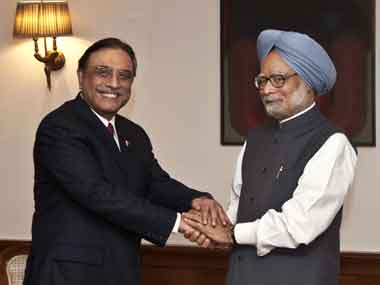Washington: India-Pakistan meets carry an element of Bollywood hope of good (relations) triumphing over evil (intentions) but in retrospect they begin to seem unrealistic despite compelling acting, terrific ambience and an earnest supporting cast because life intrudes. This is not to say we don’t need a Bollywood injection once in a while, feel good for three hours before going back to the humdrum of reality. The reality of terrorist leader Hafiz Saeed roaming free to say nothing of the ISI officers named by David Headley and Ajmal Kasab for the Mumbai attacks, the reality of Pakistan’s “deep state” and its goals, the reality of a society in the grips of radicalism. The reality of prominent Pakistani commentators going the extra mile to defend “the” Hafiz Saeed on grounds of international law and all. The reality of Pakistani opposition politicians also defending the same man who regularly tops the venom index. [caption id=“attachment_273228” align=“alignleft” width=“380” caption=“AP”]  [/caption] But back to the Bollywood dream sequence. President Zardari’s one-day, private-cum-state visit to India last Sunday was full of promise and hope. Some analysts even hailed him as a leader greater than his late wife for suddenly getting religious fever and responding to a call from the Khwaja – Ajmer became a good cover for stopping in New Delhi and lunching with Prime Minister Manmohan Singh. It was a clever move to bypass the army’s objections and India’s reluctance to host him just yet. The buzz from the meeting was about India and Pakistan following the “India-China model” – that is moving on with trade and keeping Kashmir for a later generation to resolve. The logic goes that growth in trade would build trust allowing incremental progress on other more contentious issues. It is also said that economic ties would create a larger “peace constituency” in Pakistan to have good relations with India. Following the China model would be a good move. But some things need to be clarified. In exchange for trade, is Kashmir being put on the back burner or is it the question of terrorism? If the PM goes to Pakistan – as is the fervent aim of the Z company – without any movement on the vital question of terror, we will know the answer. Of course, Pakistan is pushing for a visit. Salman Bashir, its new ambassador to India, has said it was a top priority. Islamabad knows Singh wants to visit (legacy issues, a village called Gah, perhaps even electoral gains) and if he does, the tacit message would be that Pakistan has delivered on the terror issue. Defining the nature of that delivery would be an exercise in high diplomacy for both sides. Truth is that more than four years after the Mumbai attacks, Pakistan has made little effort to try to find, prosecute and punish the planners. Instead, scary coalitions like Difa-e-Pakistan are born, allowed to grow and even nurtured by the army-ISI where “the” Hafiz froths at the mouth and incites violence against India. Why this mainstreaming of terrorists? Pakistan must surely have preventive laws under which mad men or man-made madmen who threaten public order can be booked. The rants of “the” Hafiz have implications for India down the line as the megaphone of internet and YouTube spread his brand of hate across borders. When confronted with Indian (and the world’s) demands to shut down terror shops, Pakistani representatives continue to obfuscate and play with the real issue. Give us “evidence” is their constant refrain. If Indian dossiers, intelligence intercepts and confessions by Headley and Kasab are not enough to propel Pakistan’s investigating agencies to dig further and find more evidence, what is? The conspiracy to attack Mumbai was hatched inside Pakistan and the primary responsibility rests with the state on whose soil the planning, coordination, acquisition of weapons and boats took place. Please don’t insult the ordinary intelligence of ordinary people by repeated demands for more evidence. Then there is a related question. If the China model for normalization of Indo-Pak relations is followed, would the constituency for peace, which may grow with more trade with India, outpace the Hafiz Saeed constituency? The deep state supports one but not necessarily the other. At least there is no evidence that the Pakistan military and ISI have decided on trade as a national good rather than trade for their own good. The contradictions of Pakistan are just too many at least for now to make hopes for real progress unreal. Yes, India should strengthen the hands of the civilian government against the deep state but can the civilians deliver on the key issue of terror? The answer is no. India can be generous and understanding as it has been on the issues of Most Favoured Nation status granted in the last decade, visas and even terrorism. But only until the next terror attack when relations built on fragile planks and without the full cooperation of the deep state will rupture. Diplomacy conducted between terror attacks is by definition doomed. But it gives us dream sequences in exotic locales, poetry of perfection and a gorgeous sunset before we wake up to “the” Hafiz reality. You can follow Seema Sirohi on Twitter @seemasirohi
India should strengthen the hands of the civilian government against the deep state, but can the civilians deliver on the key issue of terror? The answer is no.
Advertisement
End of Article
Written by Seema Sirohi
Seema Sirohi is a foreign policy analyst currently based in Washington. She has worked for The Telegraph (Calcutta), Outlook and Ananda Bazar Patrika in the past, reporting from Geneva, Rome, Bratislava, Belgrade, Paris, Islamabad and Washington on a range of issues. Author of Sita’s Curse: Stories of Dowry Victims, she has been a commentator on BBC, CNN and NPR. see more


)
)
)
)
)
)
)
)
)



